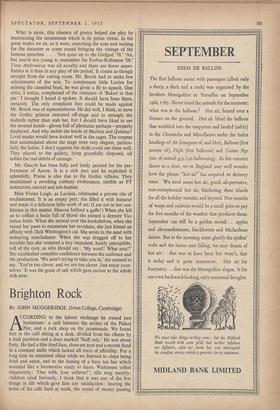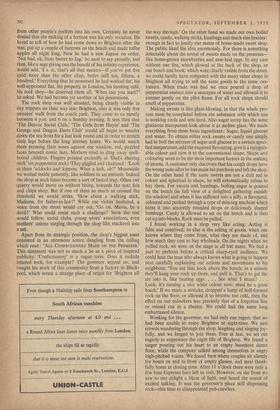Brighton Rock
CCORDING to the labour exchange he owned two businesses: a café between the arches of the Palace Pier, and a rock shop on the promenade. We found him in the café sitting at a desk, divided from his clients by a frail partition and a door marked 'Staff only.' He was about forty. He had a thin tired face, close-set eyes and a mouth fixed in a constant smile which lacked all trace of affability. For a long time he remained silent while we listened to chips being fried and eaten, and to the hissing of a busy tea bar which sounded like a locomotive ready to leave. Waitresses yelled inipatiently : 'One with, four without ! '; tills rang merrily; children cried furiously. I think that it was one of the few things in life which gave him any satisfaction : hearing the noise of his cafe hard at work, the sound of money passing from other people's pockets into his own. Certainly he never denied that the making of a fortune was his only vocation. He loved to tell of how he had conic down to Brighton after the war, put up a couple of barrows on the beach and made toffee apples all night long. Now he had a new Jaguar on order. 'Not bad, eh, from barrer to Jag,' he used to say proudly, and then, like a sage giving one the benefit of his infinite experience, would add, s. d., that's all that matters—if you've got five quid more than the other chap, better still ten, fifteen, a hundred.' Everything that he possessed he had worked for, his well-appointed flat, his property in London, his teeming card, his rock shop—he deserved them all. 'When can you start?' he asked. We had become yet another of his possessions.
The rock shop was well situated, being clearly visible to day trippers on their way into Brighton, also it was only five minutes' walk from the coach park. They came to us mostly between 4 p.m. and '6 on a Sunday evening. It was then that `The Denver Social Club.' The Girls from Hayes' and 'The George and Dragon Darts Club' would all begin to wander down the sea front for a last look round and in order to stretch their legs before the long journey home. We would watch them pressing their noses against our window, red, putzled faces beneath comic hats. Mothers tried to drag away spell- bound children. Fingers pointed excitedly at `Dad's shaving stick' (in peppermint rock).•They giggled and chattered : 'Look at them 'addocks and kippers. What a lark, eh?' Meanwhile we waited inside patiently, like soldiers in an ambush. Indeed the shop at such times became a sort of baited trap. Often our quarry would move on without biting, towards the next fish and chips shop. But if one of them so much as crossed the threshold we would strike. 'How about a walking stick, Madame, for father-in-law?' While our victim hesitated, a voice from the street would cry out, `Go on, Mavis. be a devil!' Who could resist such a challenge? Soon the rest would follow, social clubs, young wives' associations, even mothers' unions surging through the shop like mackerel into a net.
Apart from its strategic position, the shop's ,biggest asset consisted in an enormous notice dangling from the ceiling which read : `ALL CONFECTIONERY MADE ON THE PREMISES.' This statement was not so much a lie as a piece of inspired publicity. 'Confectionery' is a vague term. Does it include lettered rock, for example? The governor argued no, and bought his stock of this commodity from a factory in Black- pool, which seems a strange place of origin for 'Brighton all the way through.' On the other hand we made our own boiled sweets, candy, walking sticks, humbugs and much else besides: enough in fact to justify our status of home-made sweet shop. The public liked the idea enormously. For there is something delectable about the sound of sweets made on the premises— like home-grown strawberries and new-laid eggs. In any case without our fire, which glowed at the back of the shop, or our bench and hook, which were clearly visible from the street, we could hardly have competed with the many other shops in Brighton all trying to sell the same goods to the same cus- tomers. When trade was bad we once poured a drop of peppermint essence into a saucepan of water and allowed it to simmer gently on the pilot flame. For all rock shops should smell of peppermint.
Making sweets is like glass-blowing, in that the whole pro- cess must be completed before the substance with which one is working cools and sets hard. Also sugar syrup has the same glutinous transparent look about it as molten glass. We made everything from three basic ingredients: Sugar, liquid glucose. and water. To obtain either rock sweets or candy one simply had to boil the mixture of sugar and glucose to a certain speci- fied temperature, add the required flavouring, give it a recognis- able colour and turn it to the conventional shape. Shape and colouring seem to be the most important factors in the making of sweets. A customer only discovers that his cough drops have the wrong taste after he has made his purchase and left the shop. On the other hand if the same sweets are not a dull red in colour and spherical in shape, he will automatically refuse to buy them. For sweets and humbugs, boiling sugar is poured on the bench (in full view of a delighted gathering outside the window) and when it has stiffened into a jelly, is flavoured, coloured and pushed through a type of mincing machine Which turns it into smoothly rounded drops or deliciously shaped humbugs. Candy is allowed to set on the bench and is then cut up into blocks. Rock must be pulled.
I found working in a shop very like acting. Acting is false and contrived; so also is the selling of goods, when one knows where they come from, what they are made of, and how much they cost to buy wholesale. On the nights when we pulled rock, we were on the stage in all but name. We had a part to perform before a critical sharp-eyed audience. We could hear the man who always knows what is going to happen next carefully explaining our actions and movements to his neighbour. 'You see that hook above the bench; in a minute they'll hang your rock up there, and pull it. That's to get the air into it, like beating eggs. . . . See what I mean'? . . . Look, it's turning a nice white colour now; must be a good batch.' If we made a mistake, dropped a lump of half-formed rock on the floor, or allowed it to become too cold, then the effect on our onlookers was precisely that of a forgotten line or missed cue in a theatre. We could feel the same long embarrassed silence.
Working for the governor, we had only one regret; that we had been unable to enjoy Brighton at night-time. We sai., crowds wandering through the shop, laughing and singing joy- fully, and we longed to join them. Free at last, we set out eagerly to experience the night life of Brighton. We found a singer pouring out his heart to an empty basement dance floor, while the company talked among themselves in angry high-pitched voices. We found bars where couples sit silently for hours on end in front of empty glasses, and steal thank- fully home at closing time. After 11 o'clock there were only a few lone Espresso bars left to visit. However, on the front we saw to our delight a blaze of light, and heard the sound of excited talking. It was the governor's place still dispensing rock—this time to disappointed pub-crawlers.



































 Previous page
Previous page